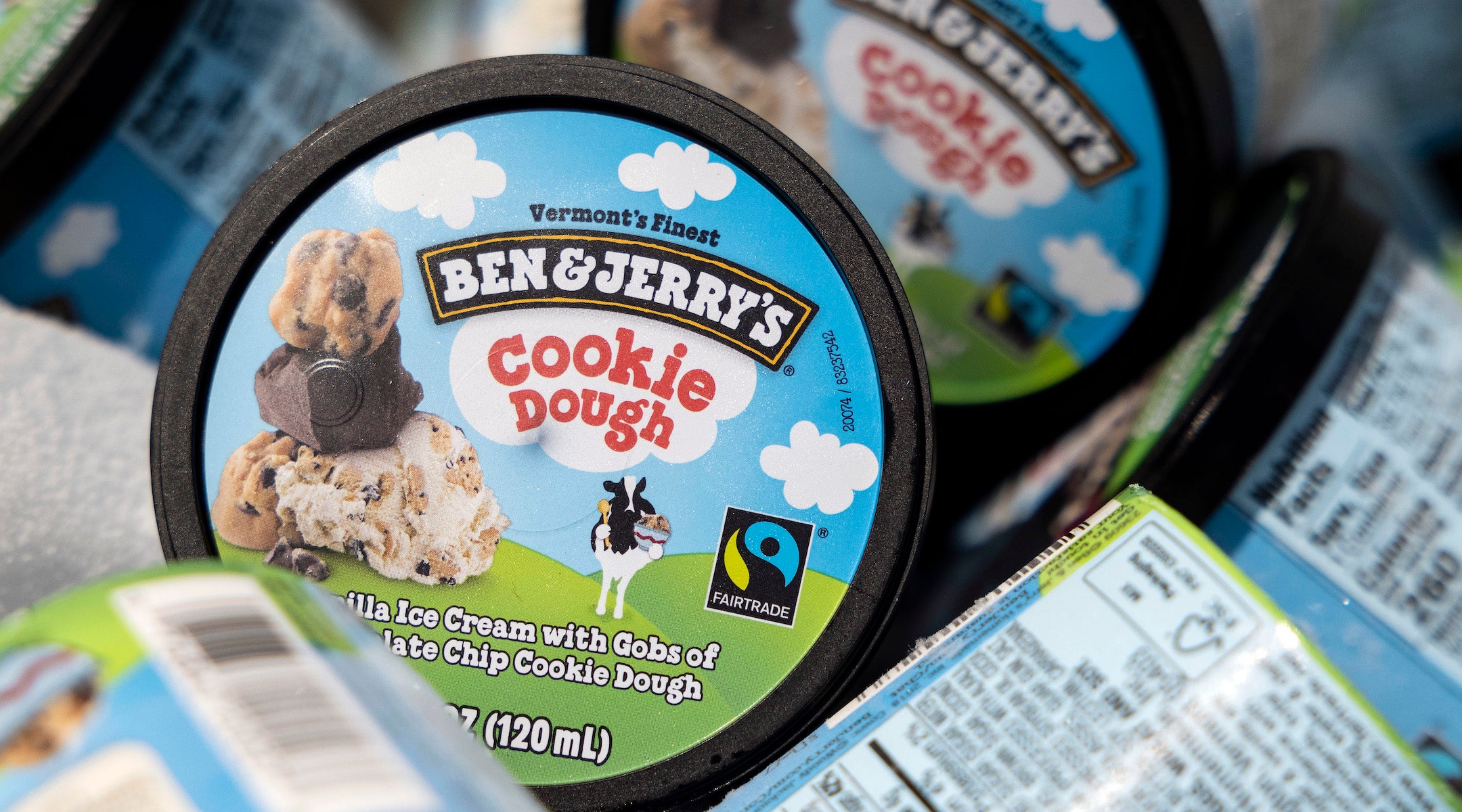(JTA) – After nearly a year of legal and financial battles, Ben & Jerry’s will continue to be made and sold in Israel and the West Bank, as its parent company Unilever announced Tuesday it had reached an agreement with its current Israeli licensee to assume ownership of the brand in the region.
Under the terms of the new agreement, Unilever is selling its Israel business interest in the ice cream maker to Israel-based American Quality Products, Ltd., which has owned Ben & Jerry’s Israel factories and distributed the product in Israel since 1987.
“The new arrangement means Ben & Jerry’s will be sold under its Hebrew and Arabic names throughout Israel and the West Bank under the full ownership of its current licensee,” Unilever’s official announcement stated.
American Quality Products and its Israeli owner, Avi Zinger, had sued Unilever in U.S. court in March, in an attempt to pressure the British conglomerate to continue their business relationship following the announcement by the Ben & Jerry’s board last summer that the brand would stop selling ice cream in “occupied Palestinian territories.” The Ben & Jerry’s board, which has a history of social justice advocacy, made its announcement following Israel’s deadly conflict with Hamas that killed hundreds of people and prompted international outrage.
For much of the past year, as it weathered intense criticism from pro-Israel groups, Unilever maintained that it has little power to influence the Ben & Jerry’s board’s decisions, under the terms of their unique 2000 acquisition agreement that gave the brand substantial decision-making freedom.
Unilever previously stated that its ultimate goal was to partner with a new company to continue selling Ben & Jerry’s within Israel’s 1967 borders, cutting out the business activity in the West Bank that the board had objected to. Zinger and his attorneys maintained that this was tantamount to “boycotting parts of Israel,” and that Israeli law prevented him from conforming to the board’s demands.
Now, however, the parent company has taken a different tack. Following what it said was “extensive consultation over several months, including with the Israeli Government,” Unilever said that its Ben & Jerry’s agreement still afforded the company “primary responsibility for financial and operational decisions,” which gives it the right to make the sale to Zinger’s company to continue operating in Israel as it wishes, despite the board’s objections.
In a statement, Zinger called the decision “a resounding defeat for discrimination.” He and his attorneys at the pro-Israel Louis D. Brandeis Center for Human Rights Under Law claimed that the original Ben & Jerry’s board decision had been influenced by the Boycott, Divestment, Sanctions movement targeting Israel, which they defined as discriminatory.
“Israel welcomes today’s announcement by Unilever that Ben & Jerry’s in Israel will continue to sell its ice cream without discrimination,” Israeli Foreign Minister Yair Lapid and Economy Minister Orna Barbivai said in a joint statement, adding that Lapid had been involved in negotiations between Zinger and Unilever CEO Alan Jope.
The Anti-Defamation League said it was also involved in the behind-the-scenes negotiations to keep the brand in Israel. CEO Jonathan Greenblatt said the announcement was “as welcome as a scoop of Cherry Garcia on a hot summer day,” adding, “Today is yet another demonstration of the ineffectiveness of trying to boycott and ostracize Israel.”
The move was also applauded by the Conference of Presidents of Major American Jewish Organizations, which said Jope had sent the group a letter reaffirming Unilever’s rejection of the BDS movement, and by the Israeli-American Coalition for Action. Jope also called the Simon Wiesenthal Center to announce the deal.
Unilever, which said it employs thousands of people in Israel across its different brands, lost an estimated hundreds of millions of dollars in investment funds as a result of the Ben & Jerry’s controversy, as many states invoked anti-BDS laws to divest their public pension funds from the company in protest. The conglomerate is also facing additional lawsuits over the brand’s decision.
The Ben & Jerry’s board has not yet commented on Unilever’s sale. The company’s Jewish founders, Ben Cohen and Jerry Greenfield, supported the West Bank pullout, though they no longer are involved in its business decisions.
JTA has documented Jewish history in real-time for over a century. Keep our journalism strong by joining us in supporting independent, award-winning reporting.






